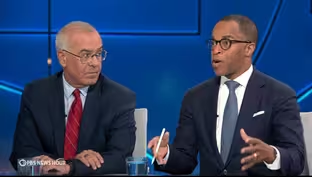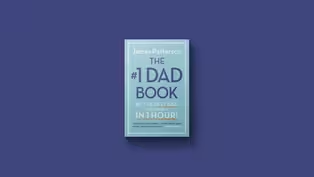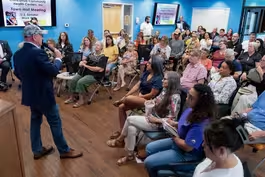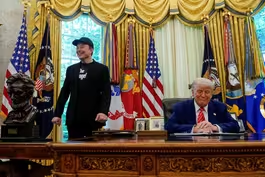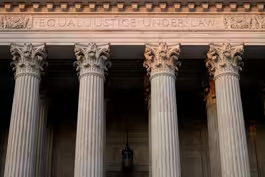
Harvard professor calls Trump's attacks 'authoritarianism'
Clip: 5/30/2025 | 8m 50sVideo has Closed Captions
Harvard professor calls Trump's attacks on funding and students 'authoritarianism'
The Trump administration’s fight with Harvard isn’t letting up. The White House has moved to strip more than $2 billion in federal grants, block international student enrollment and suspend student visa appointments. Some at Harvard are speaking out, including professor and cognitive scientist Steven Pinker. He joined Geoff Bennett to discuss his op-ed titled “Harvard Derangement Syndrome.”
Problems playing video? | Closed Captioning Feedback
Problems playing video? | Closed Captioning Feedback
Major corporate funding for the PBS News Hour is provided by BDO, BNSF, Consumer Cellular, American Cruise Lines, and Raymond James. Funding for the PBS NewsHour Weekend is provided by...

Harvard professor calls Trump's attacks 'authoritarianism'
Clip: 5/30/2025 | 8m 50sVideo has Closed Captions
The Trump administration’s fight with Harvard isn’t letting up. The White House has moved to strip more than $2 billion in federal grants, block international student enrollment and suspend student visa appointments. Some at Harvard are speaking out, including professor and cognitive scientist Steven Pinker. He joined Geoff Bennett to discuss his op-ed titled “Harvard Derangement Syndrome.”
Problems playing video? | Closed Captioning Feedback
How to Watch PBS News Hour
PBS News Hour is available to stream on pbs.org and the free PBS App, available on iPhone, Apple TV, Android TV, Android smartphones, Amazon Fire TV, Amazon Fire Tablet, Roku, Samsung Smart TV, and Vizio.
Providing Support for PBS.org
Learn Moreabout PBS online sponsorshipGEOFF BENNETT: The Trump administration's fight with Harvard University isn't letting up.
In recent weeks, the White House has moved to strip more than $2 billion in federal research grants, block international student enrollment, and suspend student visa applications.
As tensions rise, some at Harvard are speaking out, among them, renowned professor and cognitive scientist Steven Pinker, whose New York Times op-ed is titled "Harvard Derangement Syndrome."
I spoke with him yesterday.
Steven Pinker, welcome to the "News Hour."
STEVEN PINKER, Harvard University: Thank you.
GEOFF BENNETT: You have described many of Harvard's critics as having what you call Harvard derangement syndrome, this tendency to see only flaws in the institution, while ignoring its many strengths and contributions.
Explain what you mean by that and how you distinguish legitimate criticism from what you see as irrational hostility.
STEVEN PINKER: Yes, so Harvard does have some problems.
I co-founded the Council on Academic Freedom at Harvard to deal with them.
There have been some cancellations of faculty for saying politically sensitive things, leading to outrage mobs.
There is a political skew of the faculty, with probably not enough conservative voices.
There have been protests that have crossed the line from expression of opinion to intimidation and silencing.
On the other hand, Harvard is a really big place.
There are 24,000 students, 12 schools, three campuses, 2,700 professors.
And if there's an incident here or there, it can go viral and it can make people think that Harvard is nothing but cancellations or nothing but intrusive demonstrations, when, in fact, most of what happens at Harvard are students learning, professors doing research, people publishing their findings, including many politically incorrect findings.
The fact that every once in a while something catches the attention of someone and there's a mob doesn't mean that Harvard lives under a regime where no one can publish anything but a left-wing opinion.
Far from it.
GEOFF BENNETT: With the administration freezing what is now more than $2 billion in federal funding to Harvard, what potential long-term effects do you foresee on scientific innovation and research, not just at Harvard, but across the country?
STEVEN PINKER: Well, the singling out of Harvard for zeroing out of all support of science is part of a massive cutting of funds across the board in all universities.
Harvard went to zero.
Other universities, it may have gone to 50 percent or less, but that's still a lot, probably even less than 50 percent.
And it means that the scientific innovations that have led to treatments for cancer or heart disease, for the search for some kind of diagnosis and treatment of Alzheimer's or Parkinson's, of energy technologies, of hack-proof computer networks, of wound care, of prosthetics for people with paralysis, I could go on and on, all of these will be slowed down or sent to other countries, including China.
GEOFF BENNETT: Should universities like Harvard have anticipated the risks of political strings attached to billions of dollars worth of federal funding?
Is this current crisis, at least in part, a failure of imagination about what could happen when a populist administration turns against institutions it sees as elitist or pushing an agenda?
STEVEN PINKER: Well, this is an extraordinary administration.
It's not just populist.
We had a populist administration from 2017 to 2021.
It was nothing like this.
This is out-and-out authoritarianism.
This is the executive branch trying to throttle civil society organizations that they see as a possible source of alternative analysis of criticism, of democratic dissent, which includes the media, as I don't have to tell you, as well as law firms, the judiciary, cultural institutions, anything that could serve as a voice for any opinion other than the one that keeps the government in power.
So it's not clear that Harvard could have anticipated it.
Harvard did have problems which it should have solved no matter what, even if it didn't anticipate being strangled by the federal government.
GEOFF BENNETT: There's also the matter of the Trump administration's move to revoke Harvard's ability to enroll international students, which a federal judge has blocked.
President Trump has framed this as a national security issue, describing international students as - - quote -- "people from areas of the world that are very radicalized.
We don't want them making trouble in our country."
At the same time, he says that Harvard should cap the number of international students it admits to create space for American students.
What does all of that suggest to you?
What does it reveal about the motivations behind this?
STEVEN PINKER: Yes, well, international students and international scholars, also threatened, are a massive source of strength to Harvard, partly because we can select from the best in the world, as well as the best in the United States, partly because people from other countries do have other perspectives.
Part of being an educated person is, you know what life is like and what ideas are circulating in other parts of the world.
And how better than to hear it from the mouths of people who actually come from those parts of the world?
And the idea that the foreign students are sources of radicalization and agitation is just out of touch with reality.
We have students from Netherlands, from Israel and from Macedonia and from Peru who are some of our most studious students because, unlike many Americans, who kind of take their good fortune for granted, they are so grateful to be allowed the chance to study here, that they're the ones that show up at my office hours and volunteer to work on research projects.
And they're by no means the radical students who are the -- causing the disruptive demonstrations.
GEOFF BENNETT: As you have said, and as you noted in your Times piece, you have not been shy about calling out and criticizing Harvard when you feel it's necessary.
There are those who ask, though, where was this concern from Harvard and peer institutions when it implemented policies that arguably discriminated against Asian American applicants and when it implemented politically charged DEI mandates?
Is this selective outrage now that the criticism is coming from the political right?
STEVEN PINKER: Well, it's -- I think those are reforms that Harvard should have made.
And the thing is that every institution needs reforms, because times change, people point out problems that crept up gradually and at some point have to be dealt with.
But what the administration is doing right now is -- as I put it, somewhat melodramatically, is cutting the carotid and watching Harvard bleed out.
It's just an all-out assault by every means that the executive can think of, completely out of proportion to the particular problems, which indeed call for particular solutions, not for strangling the whole university.
GEOFF BENNETT: Does the moment require more than a legal fight?
I mean, if you make the argument that this threatens the enlightenment values that you hold dear, open inquiry, academic autonomy, pluralism, that there should be a moral argument in the public square beyond just the legal fight?
STEVEN PINKER: Yes, I absolutely think there should be.
In fact, one of the ways that universities have gotten themselves into this pickle is that they haven't really (AUDIO GAP) universities.
They contribute to society, in addition to practical applications like cures.
But why is it a good idea for people to be educated?
Why is it a good idea for their -- for knowledge to increase?
The universities, I think, too often have just tried to placate their students, to make bad publicity go away.
And that has backfired, because they haven't been able to actually articulate good reasons why some protests should be shut down, why academic freedom should be protected.
And if someone articulates a conservative opinion, they shouldn't be forced to grovel in a university.
Universities should be better at saying we are all better off when there is a marketplace of ideas, when there are institutions that can operate free from government control, when there are means of enhancing our knowledge, expanding our knowledge, and conveying it to the next generation.
We are all better off.
GEOFF BENNETT: Steven Pinker, thank you for your time and for your perspectives this evening.
We appreciate it.
STEVEN PINKER: Thank you.
Brooks and Capehart on Musk's impact on the U.S. government
Video has Closed Captions
Clip: 5/30/2025 | 10m 10s | Brooks and Capehart on Elon Musk's impact on the U.S. government and agencies (10m 10s)
James Patterson reflects on fatherhood in 'The #1 Dad Book'
Video has Closed Captions
Clip: 5/30/2025 | 6m 47s | James Patterson reflects on fatherhood and what it means to him in 'The #1 Dad Book' (6m 47s)
Members of Congress face frustrations over the Trump agenda
Video has Closed Captions
Clip: 5/30/2025 | 3m 21s | Members of Congress face frustrations over the Trump agenda from voters at home (3m 21s)
Mississippi governor on Medicaid, disaster funding impacts
Video has Closed Captions
Clip: 5/30/2025 | 7m 44s | Mississippi governor on how changes to Medicaid, disaster funding could impact his state (7m 44s)
Musk leaves White House after cutting to jobs and agencies
Video has Closed Captions
Clip: 5/30/2025 | 7m 18s | Elon Musk leaves White House position after overseeing slashing of jobs and agencies (7m 18s)
News Wrap: Supreme Court lets Trump strip migrant status
Video has Closed Captions
Clip: 5/30/2025 | 7m 10s | News Wrap: Supreme Court lets Trump strip humanitarian parole protections from migrants (7m 10s)
Providing Support for PBS.org
Learn Moreabout PBS online sponsorshipSupport for PBS provided by:
Major corporate funding for the PBS News Hour is provided by BDO, BNSF, Consumer Cellular, American Cruise Lines, and Raymond James. Funding for the PBS NewsHour Weekend is provided by...
